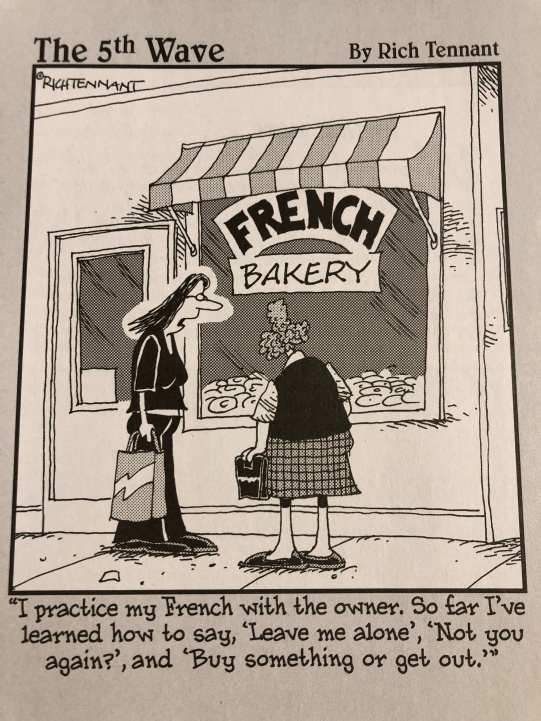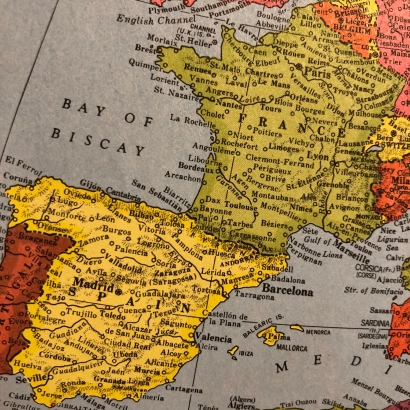We recently received some very welcome news: The Belgians are willing to endure another conjoined vacance with us. (It’s not until 2020, which is good because we need time to prepare ourselves physically. It will be a cycling-centered trip, after all, and this is an active family, full of competitive endurance cyclists and distance-runners, including a former member of a Belgian U23 national cycling team, and soon, a participant in the 250K Sahara Desert ultramarathon. Comment dit on driven en français?)
But not only does the body need conditioning. So, too, does the brain. In other words, it’s time to dust off the French books… we’re going back to France!

My quest to try to stuff a third language into my cranium began several years ago. We knew a trip to Belgium and France was in the offing, and the seed of interest in learning French that had been lying dormant in my brain began to sprout. But before I tell you how I acquired this beautiful but difficult language, we’ll embark upon a fascinating journey into the past for a riveting glimpse at my linguistic history. Fasten your seatbelts…
English
If you’re a native English speaker like I am, we probably acquired our shared mother tongue in much the same way. For me, there were a few small bumps along the way; for example, I spent an indeterminate amount of my youth pronouncing chaos CHAAH–os. Also, a game of Trivial Pursuits with my family revealed to me – amid snorts of laughter from my older brother – that the famous Renaissance-era thinker Copernicus was not pronounced COP-er-nick-us. On the positive side, I was an excellent speller. The only person who had even the remotest chance of knocking me off the top spot in our weekly elementary school spelling bees was my best friend Amy (who, with the benefit of hindsight and using the modern parlance, could more accurately be described as a frenemy). I also excelled in AP English, especially the grammar, but oddly, never once considered majoring in – or even minoring in – English. (Thank goodness, too. My Bachelor’s degree in Psychology is SO much more practical.)

Spanish
With the advancement to junior high came my first exposure to Spanish. With two years under my belt by the time I got to high school, I was able to skip straight to Spanish II. Under the tutelage of my Chilean maestra, I became a teacher’s pet and a class star, something I reveled in until my bubble was burst in college, where I was surrounded by people who were far, far abler than I was. I struggled valiantly until junior year when I had to start reading Latin American novels. That’s when I realized the folly of never taking the opportunity to study abroad. Each page took me an hour to decode, and because it was authentic literature, most of the words were slang or colloquialisms and thus nowhere to be found in my suddenly worthless Spanish-English dictionary. This nightly hair-pulling exercise usually left me in tears, and I showed up to each class foggy-brained, red-eyed, and unprepared, with only the most tenuous grasp of the plot, while my peers eruditely dissected and debated all around me. Somehow I scraped by with a B and got my minor in Spanish. I have used it only infrequently since then, but as you will soon see, nine years of Spanish learning does not go quietly into the night.

French
My first foray into French occurred when I was 15. About to embark on a month-long foreign exchange experience to the French-speaking half of Belgium, I memorized a handful of useful, if trite, phrases. (I do not speak French. Do you speak English? Where is the bathroom?) You are probably wondering why a little high school Spanish superstar like me didn’t choose a Spanish-speaking country for my exchange. Now I would tell you it was for diversity of experience. (I knew then that the following year I’d be going on a school trip to Spain.) Back then, however, I probably would have shrugged and mumbled inelegantly, “Dunno. Just ‘cuz.” And incidentally, though they were not my host family, this student exchange is where I first met The Belgians, forming the first link in a transatlantic chain of visits and cementing a multi-generational familial friendship that has spanned 30+ years.

Decades later, as I mentioned earlier, a planned trip inspired me to take my learning beyond mere survival French. I started out using the Rosetta Stone® computer program, an excellent, if expensive, resource that gave me a great start. (It’s only flaw is the lack of an ancillary workbook, a glaring oversight from a company synonymous with language-learning.) My at-home training was buoyed by halting “conversations” with the husband, whose five long years of high school French have left him with bad memories and a sketchy grasp of the language (kinda like me with math). Our discourse is peppered with protracted “uuuuuuuhs” and uhhhhhhhs, which buy time while we scramble to remember the next word sitting tantalizingly just out of reach.

Later, prior to our next trip to France, I bade adieu to Rosetta. It’s not that I had learned all I could from it. Not even close. Rather, I had gotten to the point in the program where the next units were full of lessons on thorny topics like the conditional tense and subjunctive mood and I was desperately trying to avoid them. I merely wanted to be understood in basic French, after all, not deconstruct the finer points of, say, Descartes’ theory of dualism (which I probably wouldn’t be able to do in English, either). Basic past tense and future tense were about as far as I was willing to push myself. Enter the community ed class. I registered to take French I and II simultaneously and, just as I’d predicted, I was among the most advanced students in French I, where I had 90 minutes to enjoy lording it over the newbies each week, before the subsequent 90 minutes in which I was largely out of my depth and part of a small gaggle of class idiots.

I also supplemented with free and low-cost resources wherever I could find them.


This next trip to France has me changing tack once again. This time, I’ve bought a Learning French DVD with accompanying workbook (See, Rosetta?) from the Great Courses® mail order company.

There are a couple of things, however, that could interfere with my attempts to revive my French:
Latin
For Christmas, I asked for – and received – the Great Courses® Latin 101 course.

Spanish vs. French: a battle for dominance

For years, the husband and I have talked about this return trip to France. The ultimate goal is for the husband to climb Col du Tourmelet, completing the trifecta of iconic Tour de France rides on his Dust-Farm-Pail List. This particular mountain is in the Pyrenees, so we’ve always fantasized about starting the trip in Barcelona. What does that have to do with anything? It means I would need to resurrect my long-slumbering Spanish for the first week or so of the trip, then switch to French for a long stretch, then revert back to Spanish for the last few days as we return the car to our starting point and fly out. This will be no small task. I’ve spent several years playing Whack-A-Mole with my Spanish, which has interfered with my French in the worst way, popping up uninvited each time I construct a French sentence. Finally, I’ve gotten to the point where my French is interfering with my Spanish (on the rare occasions I do mangle use it – usually with a parent at school when I’m called in desperation by the office staff). This is a good thing, in my book, and I don’t want to ruin it by letting my Spanish see daylight.

Wondering if I could rely on the husband, I took an inventory of his Spanish knowledge. Not including counting to five, he knows nine words and phrases:
- hola (hi)
- adios (goodbye)
- vaya con Dios (go with God) – that should come in handy
- cerveza (beer)
- baño (bathroom)
- por favor (please)
- gracias (thank you)
- feliz navidad (Merry Christmas) – we’re going in summer so that’s useless
As you can see, the burden of communicating in Spain is going to land squarely on my épaules, uh, I mean espaldas. See? This is going to be a disaster of Frenish proportions.
So I’m putting out a plea for help. If you have any advice on how I can compartmentalize these two dueling Romance languages in my brain, please let me know. If not, you can at least wish me bon chance, or if you prefer, buena suerte.

Konnen sie das bitte wiederholen? Veilen danke.
P.S. The auto correct function on my phone hated this response. The phone is one more auto correct from destruction at this point.
LikeLiked by 1 person
According to Google Translate, you wrote, “Can they please repeat that? Veilen thank you.” Hmmm… 🙂
LikeLike
Such an awesome article. I currently know enough Spanish to get around in Spanish speaking countries, but would like to become more fluent. Learning a third language would be a dream! And I saw your reference to the Sahara Ultra Marathon. Have you seen the documentary “Desert Runners”? I would love to complete one of the four one of these years.
LikeLiked by 1 person
Thanks for the compliment. I haven’t seen that documentary but I will look it up. Wow. That’s quite a goal. Good luck!
LikeLiked by 1 person
It’s a great documentary about a group of people that try and do all four desert ultra marathons in one calendar year.
LikeLiked by 1 person
I speak three languages fluently and have compartmentalized them so fully I tend to struggle to translate even the most basic sentences when caught of guard. However, I have no idea how I did it. So alas all the help I can give you is let you know it is possible. Buena suerte!
LikeLiked by 1 person
Muchas gracias. You are so talented to be able to speak three languages fluently. I can get by in French and Spanish, and I’m grateful for that, but definitely not fluent. On a side note, it’s funny how my elementary students declare in all seriousness that they speak, say, Chinese, because their friend taught them 2 words in Chinese. I don’t want to burst your bubble kiddo, but…
Oh, and I almost forgot – welcome back to the bloggosphere. I was worried you’d left us for good. Glad to see you were just taking a little break. I actually mentioned it to the husband. I was like, “I wonder where A Restless Traveler is. I hope she’s OK and nothing bad has happened.”
LikeLiked by 1 person
I’d like to say it was talent but really it was just luck, having parents from different nationalities means I had no option in the matter. Further proof is that all my adult attempts at learning a 4th language have never taken me very far.
As for my disappearance fear not, I’m here to stay. Just had my best friend over visiting me for the holidays and had no time left for blogging.
LikeLiked by 1 person
Do you happen to speak Russian? I’ve got a lot of Spanish and French under my belt. No Latin though. Just Russian. German once upon a time too, but it’s all gone now.
LikeLiked by 1 person
No Russian, except “goodbye.” I can also say “hello” in Hmong.
LikeLike
I read your whole post and this is what I think: language mixing happens when you don’t know the language deep enough, so the best thing for you might be to deepen your knowledge of one language before start learning another language.
When my sister and I learned French after learning English our English improved (we don’t know why). As you know, French and Spanish are fairly similar, they’re both romance languages so when you get a good grasp of either one of them, you might be able to extrapolate your knowledge without confusion because you know them good enough individually, thus it would be saving you time at the long run.
I would also recommend that you divide your language journey in two main aspects: phonetics (hearing and speaking) and vocabulary (reading and writing). For example, you study with this pattern: Mondays for hearing, Tuesdays for speaking and writing, etc. You find specific books about each aspect, study them separately and integrate them with practice: write articles, record yourself speaking French and assess your performance, etc. Always give feedback to yourself and know the reasons why writing or speaking this or that way is correct or wrong. If you do this for a long period of time, let’s say one year, you will see the difference.
I hope this helps!
LikeLiked by 1 person
I think you’re right… if I had started learning French back when I knew Spanish really well (say, right after college) I’ll bet there would have been a lot less mixing. Unfortunately, I started learning French at a point when my Spanish had barely been used for years.
I like your suggestion for dividing the language learning that way. The husband and I really have to get back into speaking French more around the house – that’s a great natural listening/speaking activity. I’m more motivated now to get back into the French. Thanks for your insights and thorough advice. Merci and gracias!
LikeLiked by 1 person
You’re welcome. I’m happy to know you liked the suggestion. I hope that you achieve your language learning goals this year. Also, I’m a native Spanish speaker so if you need anything that I might be able to help you with feel free to let me know. 🙂
LikeLiked by 1 person
I have no useful advice but a lot of sympathy. I believe that languages we know well colonize distinct parts of our brains. Languages we don’t know well all roll themselves in together so that under pressure you’re as likely to pull out a word in Estonian as in French. Even if you only know one word in Estonian.
With that out of the way, I read an Italian novel in translation (sorry–can’t remember much about it) in which a character says, “He was a foreigner, so we just used the infinitive.”
LikeLiked by 1 person